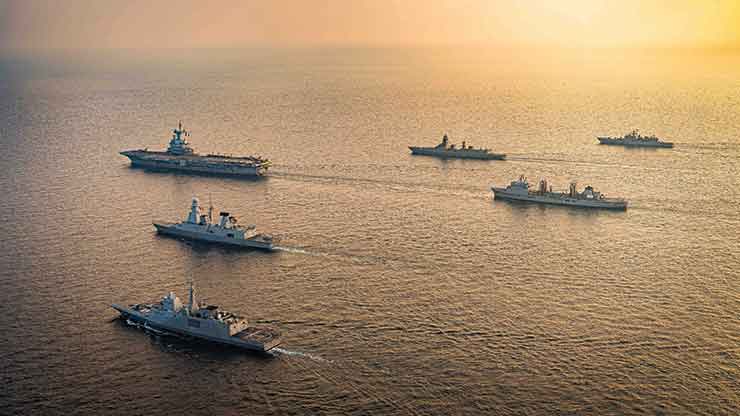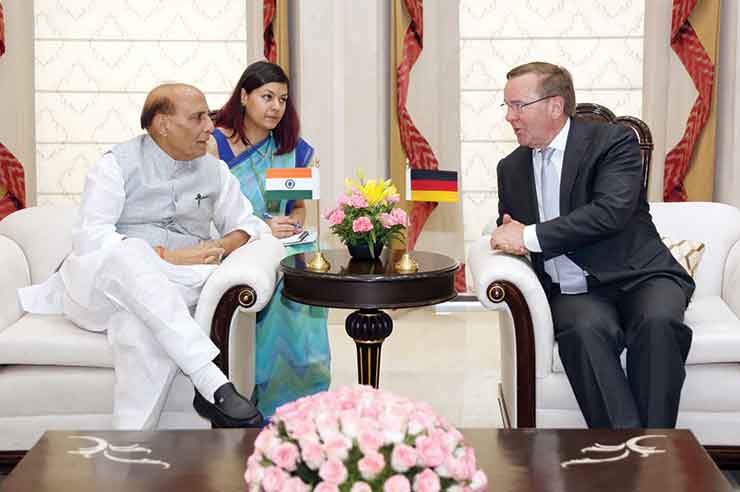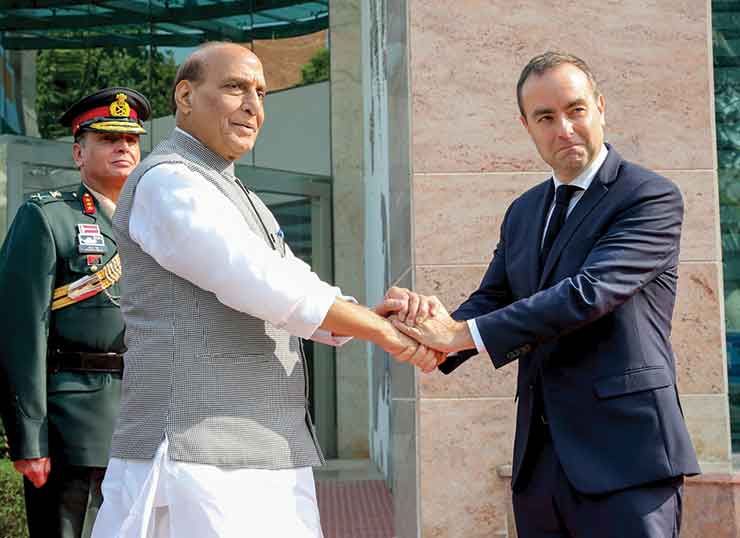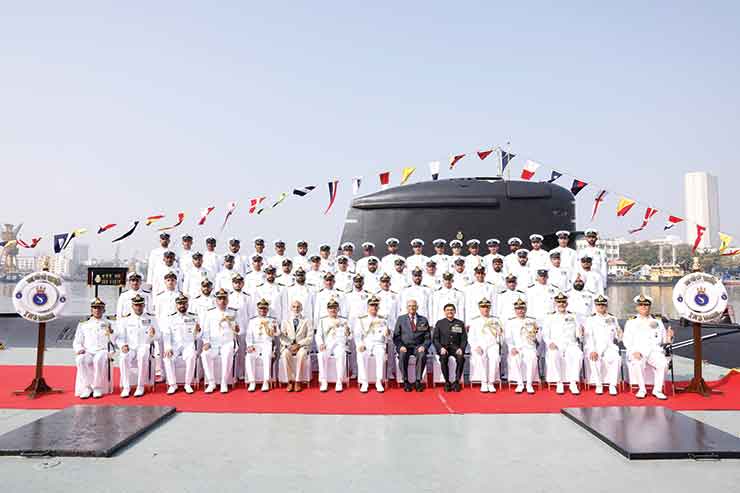
Twenty five years ago, India inked its first strategic partnership with a European nation. A quarter of a century later, the partnership has yielded many advances in technology, trade and strategy. Such partnerships are rich in potential, but could eventually be threatened by varying conceptions of the underlying concept of multipolarity.
Ongoing Defence Endeavours
The EU’s first contact with India started as early as 19621, when the ancestor of the EU, the CEE was just nascent. The aim has been mutual reinforcement, on all levels, ranging from defence to economics, and global influence and stability. Sixty years later, this partnership is still vibrant and active in addressing 21st-century challenges. Europe and India share a desire for global stability, democratic plurality and independence, and a controlled level of economic dependence on China. This general conception also influences relationships between countries, and their defence approach.
India cooperates with Italy2, to uphold its operability with European nations. In early 2023, the relationship was also elevated to the rank of Strategic Partnership. However, due to its young age, the interactions are, for the time being, limited to information sharing and common military training. In 2021, the Indian Navy conducted training3 alongside the Italian Navy. On the economic side, the trade balance rested4 at nearly 15 billion euros in 2022, slightly in favor of India. But some European nations work with India at a higher level.
In July of 2023, German Defence Minister Boris Pistorius met with Indian counterpart Rajnath Singh, to discuss Germany’s potential participation in India’s desire to further its industrial development and the resilience of its supply chain. India is a major defence client, and Germany a global producer. Military supply chains are notoriously robust and can serve as basis and inspiration for civilian equivalents. Germany’s trade balance5 with India nearly reached 25 billion euros in 2022, in steady increase. India is cooperating with many other European nations, sometimes at a far more advanced stage than with Germany.
India, as the world’s first demographic powerhouse, can simply not be overlooked by its European partners. The trade balance is in favour of India, indicating Europe’s rising need for Indian cooperation. India is now structural to the European pharmaceutical industry and web-based services
In November of 2021, New Delhi and London reinforced6 their cooperation capacity, based on information sharing at the global level, and maritime security at the regional one. This partnership also has an industrial facet. Times of India explains7; “India and the UK on Friday discussed measures to further strengthen their defence cooperation through joint exercises, maritime domain awareness and information exchange as well as defence-industrial collaboration proposals in missile systems and electric propulsion for warships.” With Brexit, Commonwealth relationships reinvested a new influx of relevance, as explained8 by analyst Facundo Arrizabalga: “By voting to leave the European Union, Britain’s future relationship with its fellow Commonwealth members has assumed both a greater significance and a greater degree of uncertainty.” In this regard, relations and approaches between the most powerful Commonwealth nations, both major naval players, gain in momentum, especially as coastline Rimland nations turned towards the Asia Pacific region.

India’s cooperation with France is even more advanced. Hindu Business Line writes9: “India is seeking cooperation for jointly working on projects including maritime technologies, land warfare systems and equipment, robotics, autonomous vehicles and platforms and cyber defence. Additionally, India is keen that indigenous companies get access to the French market for crucial global exposure which will facilitate development of a military-industrial ecosystem.” France is a major defence partner for India: not only have major military contracts long been inked between the two countries, but all exchanges occur within a diplomatically-sealed framework named the Indo-French Strategic Partnership10. This bilateral resolution goes back a quarter of a century and has permitted major achievements, with the Scorpene11 and Rafale12 contracts as latest embodiments. The balance trade 13 between India and France jumped to 15 billion euros in 2022, with 11 billion euros worth of FDI, placing it at the 11th position and rising.
All of these partnerships vary in size and intensity, amounting to14 roughly 90 billion euros of trade between India and EU nations altogether in 2021, much of which tech and defence. However, they all serve the common purpose of enhancing security and bolstering industrial exchanges for each member. Also, these partnerships place a particular focus on defence endeavours, but are not limited to them, as they oftentimes carry a civilian purpose as well. Most of all, they embody a common vision of geopolitical matters.
India cultivates its relationships with the United States and all of its close allies, and conducted naval training drills with both the Japanese and the Australian navies. But all the while, it cooperates with China, namely through the BRICS initiative, in stark contrast with US desires, and those of other Western nations
Shared Interests Beyond Borders
Europe vitally needs to maintain exports15, as a whole, if it is to remain competitive and survive on the global defence market, where US, Chinese, Israeli and Russian production keeps the pressure high. European nations, individually, also need to export, lest keeping their industries simply become too expensive and they lose their strategic independence. All domestically-sourced supplies place a heavy burden on the producing country, and exports enable the reduction of costs, production of synergies, and absorb Research and Development costs. Having the same equipment used in various theatres also helps the producers improve the quality of their equipment, with operational feedback. The atrociously expensive16 F-35 program eventually turned into a commercial triumph, confirming how exports are vital to all military programs and what 1990s Lockheed Martin CEO Augustine had previously stated: “Initially, development costs are stratospheric and almost always higher than expected because there’s actual invention involved, and the innovation process is unpredictable. But then costs can decline as companies refine their production process and more units are sold to the U.S. and allies.”

Military contracts also enact diplomatic alliances, and strengthen shared geopolitical visions. India, as the world’s first demographic powerhouse, can simply not be overlooked by its European partners. The World Bank states17 that “in 2022, India emerged as one of the fastest growing economies in the world […]. Growth was underpinned by robust domestic demand, strong investment activity bolstered by the government’s push for investment in infrastructure, and buoyant private consumption, particularly among higher income earners.” For European nations which are struggling to get rid of the wake of recent crises, such as Covid-1918, energy supplies disrupted19 by the Ukrainian war, developing ties with the Indian market is beyond common sense: doing away with it is not an option.
Indeed, the trade balance is in favour of India, indicating Europe’s rising need for Indian cooperation. India is now structural to the European pharmaceutical industry20 and web-based services21. In return, and quite symbolically, France announced its intention in early 2023 to transfer its best available defence22 technologies to India. This effort, not limited to this particular country, is an additional argument towards strengthening the partnership, as it lines up with PM Modi’s Make in India policy, India’s central development effort.
India is also able to ensure its independence by broadening its defence supplier base23, something European nations are in the best position to do, with their active and varied defence market. This policy has two discrete, yet complementary aspects: defensively, the goal is to limit dependencies by diluting them with one another. Proactively, it aims to prove that India can talk eye-to-eye with the entire world about aspects as vital as defence, prove its impartiality and enact its multilateral vision of strategic relations.
Europe could be seen more as a counter-balance, than a contributor to the multipolar world India envisions. India asserted its position in the wake of the Russo-Ukrainian conflict. This has been, at times, interpreted by western commentators as a new global configuration into ‘blocs’, with the West on one side and the BRICS sphere of influence on the other
Historical Context, Geopolitical Considerations, and Future Trajectory
Some of these relations go far back, especially considering India’s young age as a free and independent democracy. The partnerships are beneficial in all respects, and all the more so in the case of Strategic Partnerships. All of them rest on a currently common, shared and compatible vision of what multilateralism is – a base which has remained stable over the past decades, but could change in the future if strategic shifts occur.
India cultivates its relationships with the United States and all of its close allies. Indian News services reported24 in July of 2023 how India had conducted naval training drills with both the Japanese and the Australian navies. But all the while, it cooperates with China, namely through the BRICS initiative, despite its northern neighbour being a regional competitor in direct interest areas, and regional influence in the far east and Asia, in stark contrast with US desires, and those of other Western nations. In the wake of the Johannesburg BRICS summit, in August of 2023, the Chinese embassy in New Delhi stated25: “The two sides should bear in mind the overall interests of their bilateral relations and handle properly the border issue so as to jointly safeguard peace and tranquillity in the border region.

European commitment to this regional balance can, sometimes, be somewhat self-centred, or based on theoretical values and the US alliance. In this regard, Europe could be seen more as a counter-balance, than a contributor to the multipolar world India envisions. French president Macron’s posture, who diverged from US policy26 regarding China, is an exception and can be considered as simple PR, as it was followed by neither supporting decisions nor facts.
Should the conceptions and approaches of multilateralism amongst partners part ways, the entire equilibrium would be disrupted. India asserted its own position in the wake of the Russo-Ukrainian conflict. This has been, at times, interpreted by western commentators as a new global configuration27 into “blocs”, with the West on one side and the BRICS sphere of influence on the other.
The current global situation nearly guarantees this alignment will not be threatened in the near future, if only by the pragmatic interests of the involved parties. But in the future, these “natural partnerships” may be subjected to potent forces. They should therefore be surveyed, and necessary adjustments should be carried out, and not turned into bones of contention.
References
1. https://www.politico.eu/
2. https://www.thehindu.com/news/
3. https://www.livemint.com/news/
4. https://www.indianembassyrome.
5. https://www.ibef.org/indian-
6. https://www.mea.gov.in/
7. https://timesofindia.
8. https://theconversation.com/
9. https://www.
10. https://www.diplomatie.gouv.
11. https://www.naval-group.com/
12. https://www.dassault-aviation.
13. https://www.tresor.economie.
14.https://www.
15. https://www.euractiv.com/
16. https://fortune.com/longform/
17. https://www.worldbank.org/en/
18. Not available
19. https://cepr.org/voxeu/
20. https://www.institutmontaigne.
21. https://www.zdnet.com/article/
22. https://www.thedefensepost.
23. https://www.emerald.com/
24. https://newsonair.gov.in/News?
25. https://apnews.com/article/
26. https://www.theguardian.com/
27. https://theglobalobservatory.
–The writer is a defence and security industry consultant having varied experience working with medium and large companies majorly in European market. The views expressed are of the writer and do not necessarily reflect the views of Raksha Anirveda















